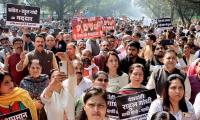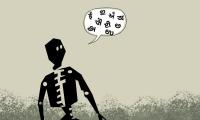Did India and Pakistan have an agreed draft statement before the 2001 Agra summit collapsed as has repeatedly been claimed in Pakistan?
The then external affairs minister Jaswant Singh throws some light on this abiding argument in his memoirs A Call to Honour that hit the stands on Friday.
Singh and his Pakistani counterpart Abdul Sattar had been told at the summit in July 2001 to attempt a draft and 'together they tried their hand at writing something on a piece of paper.'
'I attempted something in pencil on a piece of paper, he corrected/amended it, I did likewise and so it went on for sometime, to and fro. Finally, he said he would have to consult his President (Gen Pervez Musharraf) before he could assent or disagree,' he says.
Sattar reported to Musharraf, who had gone back to the hotel where he was staying, and returned with a 'few changes' and asked Singh whether it was agreeable to him. Singh responded by saying he too had to obtain the clearance of his cabinet colleagues and then prime minister Atal Bihari Vajpayee.
Singh recalls Sattar telling him that it was a 'perilous' task on which both of them were set as 'negotiators of an agreement and messengers of that agreement.'
'In such tasks, believe me, quite often, it is the messenger who gets shot,' he quotes Sattar as having said.
'This piece of paper (draft) has been variously cited as evidence of discord within the National Democratic Alliance government, of my own personal soft approach against some others, and all those speculative flights of fancy, all so entirely unnecessary,' Singh says.
The senior Bharatiya Janata Party leader says, as during any other diplomatic negotiation, so too, in this, these very preliminary notes would have got refined, shaped, expanded or explained and would then perhaps have led to some forward movement.
'This was an exercise at finding a starting point. It was not any agreed document. Besides, a draft is no more than a draft. So what is this controversy all about,' Singh quips.
He recalls showing the paper to Vajpayee, who then called his cabinet colleagues to the hotel suite. 'The collective view expressed there was that without sufficient and clear emphasis on terrorism, also accepting categorically that it must cease, how could there be any significant movement on issues that are of concern or are a priority only to Pakistan? And none that are in the hierarchy of priorities for India? How can we abandon Shimla or Lahore? Or forget the reality of Kargil? I went back and reported failure to Sattar,' Singh writes.
One of the popular theories doing the rounds in those days was that some hardliners in the Vajpayee cabinet had scuttled the Agra talks.
Recollecting the special meeting Musharraf sought with Vajpayee in a last-minute effort to hammer out an agreement, Singh says, 'I knew that a mistake was being made by our guest, for when I later asked Vajpayee what had happened, he was quiet.'
'He said it in Hindi, in effect to mean, "The visiting general sahib kept talking and I kept listening." This is an art at which Vajpayee, so often and so disconcertingly to the unfamiliar, specialises,' the former minister says.
Singh also mentions that in Agra, the critical point was Musharraf's breakfast meeting with Indian editors.
'Neither he (Musharraf) nor his team had fully assessed the consequences, in the Indian public mind, of the rather free-ranging breakfast meet that he had already had with the Indian media. Neither was he able to grasp the rationale of hesitation on other's part about his various theses. This was a perfectly understandable military tendency, but workable only in purely military environs,' says Singh in the book.
The interaction, recorded by the visitors and thereafter telecast by an Indian channel, aroused great indignation throughout the country because Musharraf came across as too belligerent, he says, adding: 'It is this that made negotiations over the draft so much more difficult.'
'This grandstanding fever had induced Gen Musharraf into a great deal of unrestrained comment in front of a select gathering of editors. Perhaps, he had been mesmerised by the media. When, therefore, such an assembly began to applaud the visiting general, and all in anticipation, he then refused to accept the presence of terrorism as an issue, continued to emphasise only the centrality of Jammu and Kashmir; was also most dismisive of Lahore; would not at all accept the reality of what Kargil was, what he had done; and he seemed almost to dismiss the Shimla Agreement.'
Singh terms as 'fruitless and needless,' a controversy that got raised about the text of what had been 'agreed upon.'
'A curious thesis was thereafter put across that if another meeting were now held between India and Pakistan, the starting point of that would have to be the piece of paper on which we had jointly worked,' Singh says, adding, 'This was truly curious. How could that paper validate what had been done in Agra, even if it had not been done.'
He, however, says there were some things, though unstated, that both India and Pakistan did agree upon post-Agra.
'The principal one was that grandstanding was not the best way to inaugurate an India-Pakistan summit,' he says. Referring to the Kargil conflict of 1991, Singh admits that Vajpayee's continued convictions to not expand the field of combat beyond the Line of Control cost many Indian lives and time too.
'Many gallant officers and soldiers had to lay down their lives because of this enormous restraint India had placed upon itself. Perhaps, this too was part of Pakistan's miscalculation that we would once again be hustled into expanding the scope of the conflict,' he says.
An interesting anecdote Singh refers to in his chapter on 1998 nuclear blasts is the serious concern over the safety of cattle at the test site in Pokhran, something that weighed heavily on the minds of those involved.
'For the team at the test site -- which included A P J Abdul Kalam, then the head of the Defence Research and Development Organisation, -- possibly death or injury to cattle was just not acceptable. A test to ascertain India's scientific and hi-tech capability would ordinarily not accord too much importance to the safety of cattle, but this team of scientists did,' he says.








